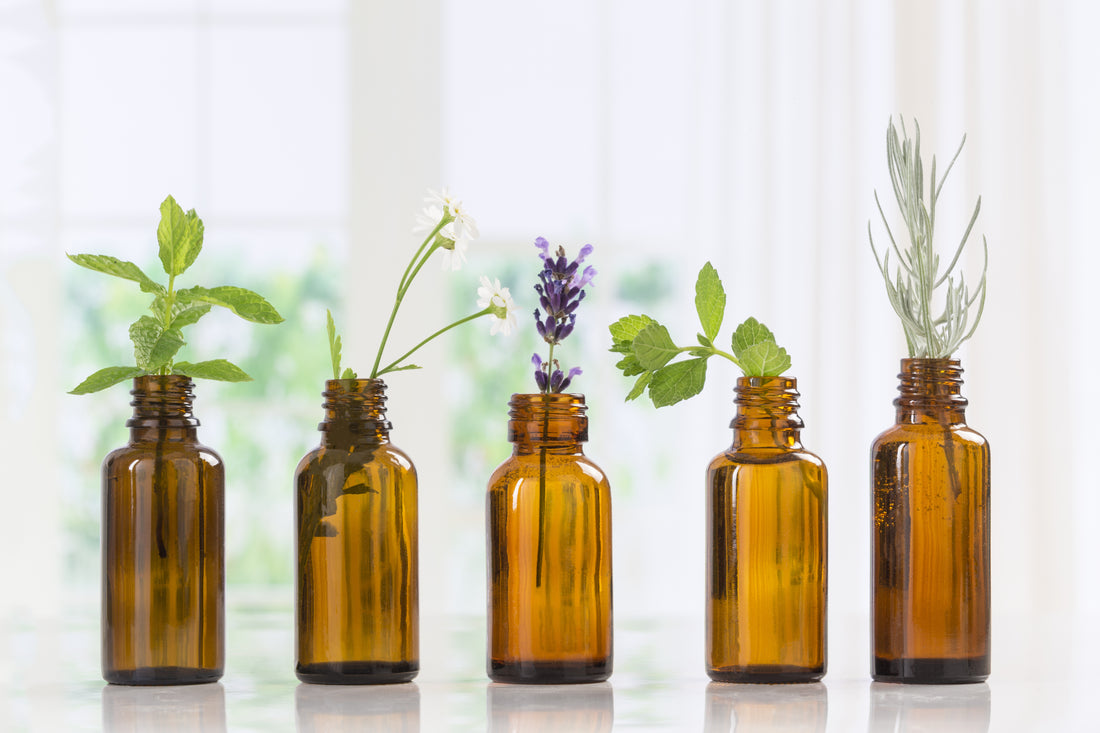If you’ve ever enjoyed an essential oil infused body massage, you’ll know how pampered your skin feels right after. But how does your skin benefit from the use of essential oils?
How is essential oil extracted?
Essential oils are highly concentrated botanical extracts derived from the seeds, roots, barks, and rinds of plants. The plant oils are extracted using a number of methods but the most common is steam distillation where the plant material – called the “charge” – is steamed in a still until the heat breaks open the charge’s storage chambers to release the oil into the steam. When the steam rises to the top of the still, it passes through a condenser – a long spiral engulfed in cold water – which condenses the steam back into liquid. At the end of the condenser is a receiver known as a “Florentine flask”, which collects the essential oil.
According to dermatologist Adam Friedman, there are thousands of different essential oils, but only about 300 are available in stores. Each essential oil has its own unique scent and health benefits, and can be used on their own or combined with other oils.
Carrier oils are different from essential oils. They are part of great skincare treatments and products yet serve a slightly different role. “Carrier oils and essential oils are made from plants. Carrier oils are used to dilute essential oils and “carry” them to your skin. That's because essential oils are potent and can cause irritation when applied directly to your skin,” describes Healthline. Carrier oils and essential oils often work together. Carrier oils like jojoba oil or argan oil are mild and moisturizing. They provide a great base to “carry” powerful essential oils like lavender or frankincense to layers of your skin.
Why are essential oils good for skin?
When most of us think of essential oils, we usually think of aromatherapy burners that make our homes smell more fragrant, or spritzers that we can spray onto our bodies. But the application of essential oils goes beyond aromatherapy, as these oils are also found in a variety of familiar products such as soap and shampoos, household cleaning detergents, and even baked treats. But can you use essential oils on skin? And is this safe?
The quick answers are “yes” and “yes.”
If you’re considering using essential oils in your skincare routine, it’s best to be discerning about what oils you choose and how much you use. Some oils such as citrus oils can be harmful to your skin because they are phototoxic, which means they may react to UV light causing skin to burn or blister. “Phototoxic essential oils include bergamot, lime and lemon, that should not be used at more than 0.5 percent on skin exposed to any amount of sunlight,” says Robert Tisserand, an essential oil educator and aromatherapy expert. “Phototoxic reactions can be pretty nasty, regardless of whether you have sensitive skin,” he adds. Clove and cinnamon oils may also cause allergic reactions and skin irritation in some people. Oils like lemongrass, cassia, black pepper, and wintergreen can also irritate skin, so dermatologist Sejal Shah recommends diluting these oils and doing a skin patch test before using it as part of your skin care regime.
There are many other essential oils, such as lavender, chamomile, tea tree, frankincense, and sandalwood, that offer skin benefits, and that can help tone, clear, and brighten skin. Scientific studies have found that tea tree oil is beneficial in the treatment of acne, while lavender and cedarwood can reduce discoloration from scars, thyme can help stimulate blood flow to the skin, and rosemary can be effective in treating acne.
What essential and carrier oils are good for skin?
Lavender (essential oil): Besides having a wonderful fragrance, lavender oil can reduce the appearance or wrinkles, brighten skin, and reduce acne breakouts. It can also sooth itchy, dry skin, and it’s antifungal properties make it a good eczema treatment.
Tea tree (essential oil): Tea tree has excellent anti-bacterial and anti-inflammatory properties and can be used to manage skin problems associated with both dry and oily skin. It’s antiseptic properties also make it a good choice for helping wounds to heal.
Frankincense (essential oil): Ayurvedic medicine has been using this oil for thousands of years. Research is ongoing and there is evidence that this oil can help with skin elasticity, inflammation and conditions like eczema. It may also benefit people with oily and acne-prone skin.
Jojoba (carrier oil): Jojoba is a perennial plant that grows in North America and its oil is obtained from the plant’s nut. This oil is a humectant, which means it pulls water to the topmost layer of your skin to help it stay well hydrated. Jojoba oil also prevents bacterial infections, helps with managing oily skin, promotes wound healing, and soothes sunburns. Jojoba has also been known to reduce the appearance of scars, wrinkles, and fine lines by encouraging skin to produce more collagen, which helps skin stay supple and elastic. It can also sooth eczema, psoriasis, and other dry skin conditions.
Argan (carrier oil): Derived from the kernels of the native Moroccan argan tree, this oil can protect skin against sun damage, keep skin moisturized, heal skin infections, soothe itchy skin, reduce acne and oily skin, and soothe psoriasis and rosacea. A scientific study has also found that argan oil is an effective anti-aging treatment, which increases skin elasticity.
Home to many essential oil shops and producers, New Mexico is a good place to find some of the highest quality essential and carrier oils. If you want to add essential oils to your beauty regime, consider K&K Skin Products. Founded in New Mexico, our BioVer-X™️ serum is packed with ten times more anti-inflammatory and cell protective properties than resveratrol – one of the best-known skin antioxidants.
K&K Skin Products include essential and carrier oils such as lavender, jojoba, tea tree, argan, avocado, rosehip, frankincense, rosemary, and peppermint, so you get natural, yet highly effective skincare solutions.

